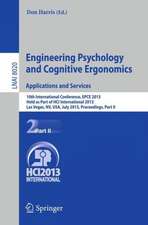Engineering Psychology and Cognitive Ergonomics: Volume 1: Transportation Systems: Engineering Psychology and Cognitive Ergonomics Series
Editat de Don Harrisen Limba Engleză Hardback – 23 oct 1997
Preț: 436.14 lei
Nou
Puncte Express: 654
Preț estimativ în valută:
83.45€ • 87.37$ • 69.05£
83.45€ • 87.37$ • 69.05£
Carte tipărită la comandă
Livrare economică 05-19 aprilie
Preluare comenzi: 021 569.72.76
Specificații
ISBN-13: 9780291398369
ISBN-10: 0291398367
Pagini: 480
Dimensiuni: 156 x 234 x 38 mm
Greutate: 0.45 kg
Ediția:1
Editura: CRC Press
Colecția Routledge
Seria Engineering Psychology and Cognitive Ergonomics Series
ISBN-10: 0291398367
Pagini: 480
Dimensiuni: 156 x 234 x 38 mm
Greutate: 0.45 kg
Ediția:1
Editura: CRC Press
Colecția Routledge
Seria Engineering Psychology and Cognitive Ergonomics Series
Cuprins
Contents: Cockpit Interface Design Issues: Attentional issues in head-up displays; A comparison of alternative helmet mounted flight control displays; An evaluation of attitude symbology for helmet-mounted displays; Altimeter design in avionics: analogue versus digital?; An evaluation of alternative launch success zone formats in tactical pilot decision making; Visual support for the control of unmanned platforms; An evaluation of feedback requirements and cursor designs for virtual controls; Evaluation of a virtual interface for a cockpit procedures trainer; GPS = got position sussed: some challenges for engineering and cognitive psychology in the general aviation environment; Design and evaluation of a 4D navigation display with direct manipulation; Error analysis as a means for user interface evaluation: a comparison of graphically interactive and traditional FMS user interfaces; Practicing what we preach; A method of designing ergonomics for activity dynamics: an aeronautical example; A task analytic approach to human centered flight deck design and evaluation; Memory load and task interference: hidden usability issues in speech interfaces; Human machine interactions with future flight deck and air traffic control systems. Air Traffic Control: Proposal for a cognitive model of en-route air traffic control; Situational awareness in air traffic control: human cognition and advanced technology; Dynamic decision aiding: the impact of adaptive automation on mental workload; Cognitive complexity in management by exception: deriving early human factors requirements for an envisioned air traffic management world; A cognitive model of expert behaviour in an air traffic control task: enhanced speech recognition using situational knowledge; Malvern Capacity Estimate (MACE) - a proposed cognitive measure for complex systems. Aviation Psychology: The invariant that drives conflict detection; Effects of mild hypoxia on decision making: a signal-detection approach; A
Notă biografică
Don Harris is the Senior Research Fellow in Human Factors Engineering in the Human Factors Group at the College of Aeronautics, Cranfield University, Bedfordshire,UK He is the founding convenor of the International Conferences on Engineering Psychology and Cognitive Ergonomics. He has written numerous papers, mostly in the field of human factors in aviation, edited Human Factors For Flight Deck Certification (Cranfield University Press, 1997) and has been a guest editor for the International Journal of Cognitive Ergonomics. He is a member of the Ergonomics Society and the International Association of Applied Psychologists. at the College of Aeronautics, Cranfield University, Bedfordshire,UK He is the founding convenor of the International Conferences on Engineering Psychology and Cognitive Ergonomics. He has written numerous papers, mostly in the field of human factors in aviation, edited Human Factors For Flight Deck Certification (Cranfield University Press, 1997) and has been a guest editor for the International Journal of Cognitive Ergonomics. He is a member of the Ergonomics Society and the International Association of Applied Psychologists.
Recenzii
’This is a book on a major topic that should be widely welcomed by researchers in transportation systems...the reader is brought up to date with recent rapid developments...all subjects covered expertly, succinctly and with up-to-date reference...should make this book widely read and if it is, could have considerable beneficial effects.’ Air Traffic Control Association, USA
Descriere
This book describes some of the most recent advances and examines emerging problems in engineering psychology and cognitive ergonomics, bridging the gap between the academic theoreticians, who are developing models of human performance and practitioners in the industrial sector, responsible for the design, development and testing of new equipment and working practices.
Caracteristici
Includes supplementary material: sn.pub/extras Includes supplementary material: sn.pub/extras
Textul de pe ultima copertă
This book constitutes the refereed proceedings of the 11th International Conference on Engineering Psychology and Cognitive Ergonomics, EPCE 2014, held as part of the 16th International Conference on Human-Computer Interaction, HCII 2014, held in Heraklion, Greece, in June 2014, jointly with 13 other thematically similar conferences. The total of 1476 papers and 220 posters presented at the HCII 2014 conferences were carefully reviewed and selected from 4766 submissions. These papers address the latest research and development efforts and highlight the human aspects of design and use of computing systems. The papers accepted for presentation thoroughly cover the entire field of human-computer interaction, addressing major advances in knowledge and effective use of computers in a variety of application areas. The total of 54 contributions included in the EPCE proceedings were carefully reviewed and selected for inclusion in this volume and are organized in the following topical sections: mental workload and stress; visual perception; cognitive issues in interaction and user experience; cognitive psychology in aviation and space; transport and industrial applications.




















